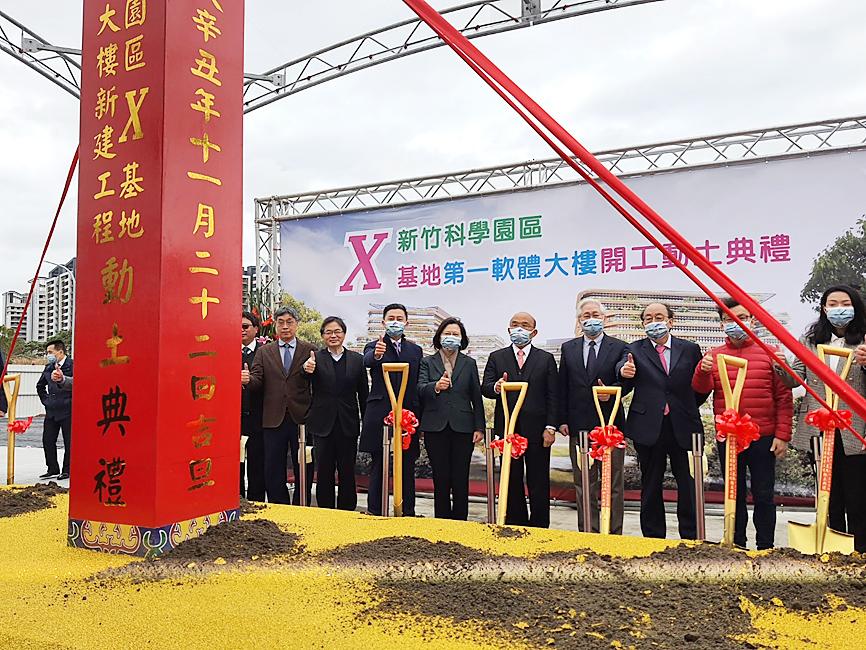Taiwan has laid a good foundation for high-tech development and plans to invest more in software innovation, President Tsai Ing-wen (蔡英文) said yesterday during a groundbreaking ceremony for the first building in Hsinchu Science Park X.
Located near the Hsinchu Science Park — which is home to many of the nation’s tech heavyweights, such as contract chipmaker Taiwan Semiconductor Manufacturing Co (TSMC) — Hsinchu Science Park X is expected to become the city’s second tech corridor and the first step to create a new tech cluster with a focus on software development, the Hsinchu City Government said.
The first building is to be completed in March 2024, and is expected to create 2,800 jobs, the city government said.

Photo: Hung Mei-hsiu, Taipei Times
The central government is planning to spend NT$18.3 billion (US$659.74 million) on the park’s development, the city government said.
Hsinchu Science Park X, which is being jointly developed by the Ministry of Science and Technology and the Hsinchu City Government, is expected to help Taiwan cement its “software power” in a wide range of areas such as artificial intelligence, 5G, information and communications technology, and big data, Tsai said.
Taiwan is a global powerhouse in semiconductor development, and after the COVID-19 pandemic started, the nation played an even bigger role in the global supply chain, she said.
As for hardware, Tsai said that Taiwan had taken the world’s top spot in the pure-play wafer foundry sector by capturing a market share of more than 70 percent, while the nation ranked as the second-largest supplier in IC design, and packaging and testing services.
Taiwan is also among the top three in the global LCD, LED and solar panel sectors, which is further evidence of the nation’s success in hardware development, she said.
TSMC is the world’s largest contract chipmaker, while ASE Technology Holding is the top IC packaging and testing service provider.
Hsinchu Science Park X is expected to attract more investment and talent, paving the way for Taiwan’s high-tech industry to integrate its software and hardware competencies, Tsai said.
Minister of Science and Technology Wu Tsung-tsong (吳政忠), who also attended the ceremony, said that the Hsinchu Science Park had started from scratch four decades ago to become the world’s most important semiconductor base, adding that he believed Hsinchu Science Park X would be able to use its software focus to support the Hsinchu Science Park.
Also at the groundbreaking ceremony, Premier Su Tseng-chang (蘇貞昌) said that to maintain the nation’s high-tech edge, he was pushing for the merger of Hsinchu City and Hsinchu County into a special municipality, which would concentrate the resources of the two areas.
The merger is an urgent issue on which Taiwan cannot afford to hesitate, Su said.
The Democratic Progressive Party (DPP) is pushing for the merger to create the nation’s seventh special municipality next year, while some opposing the plan say that the DPP is rushing the merger to help Hsinchu Mayor Lin Chih-chien (林智堅) sidestep term restrictions to run as mayor of the merged municipality.
Lin, of the DPP, was first elected Hsinchu mayor in 2014 and was re-elected in 2018.
He is not permitted to seek another term, but should the merger occur, he would be eligible to run again.

Taiwan is stepping up plans to create self-sufficient supply chains for combat drones and increase foreign orders from the US to counter China’s numerical superiority, a defense official said on Saturday. Commenting on condition of anonymity, the official said the nation’s armed forces are in agreement with US Admiral Samuel Paparo’s assessment that Taiwan’s military must be prepared to turn the nation’s waters into a “hellscape” for the Chinese People’s Liberation Army (PLA). Paparo, the commander of the US Indo-Pacific Command, reiterated the concept during a Congressional hearing in Washington on Wednesday. He first coined the term in a security conference last

Prosecutors today declined to say who was questioned regarding alleged forgery on petitions to recall Democratic Progressive Party (DPP) legislators, after Chinese-language media earlier reported that members of the Chinese Nationalist Party (KMT) Youth League were brought in for questioning. The Ministry of Justice Investigation Bureau confirmed that two people had been questioned, but did not disclose any further information about the ongoing investigation. KMT Youth League members Lee Hsiao-liang (李孝亮) and Liu Szu-yin (劉思吟) — who are leading the effort to recall DPP caucus chief executive Rosalia Wu (吳思瑤) and Legislator Wu Pei-yi (吳沛憶) — both posted on Facebook saying: “I

The Ministry of Economic Affairs has fined Taobao NT$1.2 million (US$36,912) for advertisements that exceed its approved business scope, requiring the Chinese e-commerce platform to make corrections in the first half of this year or its license may be revoked. Lawmakers have called for stricter enforcement of Chinese e-commerce platforms and measures to prevent China from laundering its goods through Taiwan in response to US President Donald Trump’s heavy tariffs on China. The Legislative Yuan’s Finance Committee met today to discuss policies to prevent China from dumping goods in Taiwan, inviting government agencies to report. Democratic Progressive Party Legislator Kuo Kuo-wen (郭國文) said

The Ministry of Economic Affairs has fined Taobao NT$1.2 million (US$36,900) for advertisements that exceeded its approved business scope and ordered the Chinese e-commerce platform to make corrections in the first half of this year or its license would be revoked. Lawmakers have called for stricter supervision of Chinese e-commerce platforms and more stringent measures to prevent China from laundering its goods through Taiwan as US President Donald Trump’s administration cracks down on origin laundering. The legislature’s Finance Committee yesterday met to discuss policies to prevent China from dumping goods in Taiwan, inviting government agencies to report on the matter. Democratic Progressive Party